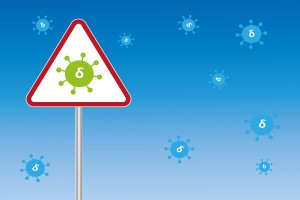
Geneva: On average, in five of WHO’s six regions, while infections have increased by 80%, or nearly doubled, over the past four weeks, in Africa, deaths have increased by 80% over the same period, the World Health Organization stated here today. It said that much of this increase is being driven by the highly-transmissible Delta variant, which has now been detected in at least 132 countries. The rise is also driven by increased social mixing and mobility, the inconsistent use of public health and social measures, and inequitable vaccine use.
WHO has warned that the COVID-19 virus has been changing since it was first reported, and it continues to change. So far, four variants of concern have emerged, and there will be more as long as the virus continues to spread.
“Hard-won gains are in jeopardy or being lost, and health systems in many countries are being overwhelmed,” Dr.Tedros Adhanom Ghebreyesus told media persons here. He pointed out that the increased number of infections is creating a shortage of treatments such as life-saving oxygen.
Twenty-nine countries have high and rising oxygen needs, and many countries have inadequate supplies of basic equipment to protect frontline health workers, he informed.
Meanwhile, testing rates in low-income countries are less than 2 percent of what they are in high-income countries – leaving the world blind to understanding where the disease is and how it’s changing. “Without better testing rates globally, we cannot fight the disease on the frontline or mitigate the risk of new, more dangerous variants emerging,” Dr.Ghebreyesus said.
WHO is supporting countries with supplies of oxygen, with guidance to help countries better detect variants, and we continue to work daily with our global networks of experts to understand why the Delta variant spreads so readily.
“But we need more,” the WHO D-G said, adding that what was required was stronger surveillance; strategic testing to improve the global understanding of where the virus is, where public health interventions are most needed, and to isolate cases and reduce transmission; well-trained and well-protected health workers and the systems to deliver the services and the tools to save lives; research and development to ensure that tests, treatments, vaccines and other tools remain effective against the Delta variant and other emerging variants.
“We need patients to receive early clinical care by trained and protected health workers, with more oxygen to treat the seriously ill and save lives…And of course, we need more vaccines,” he said.
– global bihari bureau





